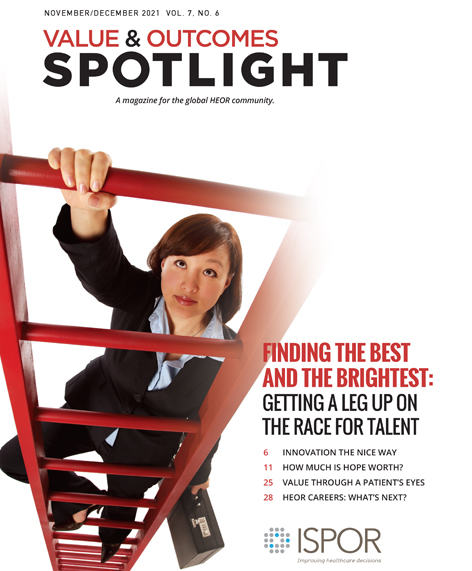Winning the Race for HEOR Talent
As the field of health economics and outcomes research (HEOR) rapidly grows on a global scale, the demand for HEOR professionals is also surging. In addition, the dearth of HEOR talent has been further exacerbated by the pandemic and will continue to be persistent as HEOR expertise expands with increased leveraging of new technologies (such as “big data” and artificial intelligence) in informing healthcare decisions. As exigency for these skills grows, we need to ensure that HEOR talent is being developed and appropriate training is provided now and in the future to meet these rising demands.
ISPOR’s mission is to promote HEOR excellence to improve decision making for health globally. As part of this mission, ISPOR has established an HEOR Competencies Framework™ for HEOR professionals. This valuable tool includes 41 competencies organized into 13 topic domains and serves as a guide to develop talent that meets the demands of the overarching HEOR field as well as provide relevance to industry requirements and academic program capabilities. Many academic HEOR programs currently use this framework in reviewing and planning their curriculum to ensure that students are appropriately trained and equipped with the necessary skills to be successful in their careers.
The ISPOR Competencies Framework™ is also relevant and an important component in HEOR industry-sponsored postdoctoral (usually PharmD) fellowships–these postgraduate opportunities have become increasingly popular among new professionals with the number of industry fellowships in the United States having risen from 442 in 2017 to 628 in 2021. These fellowships generally include a didactic component in an academic setting (eg, offering a combined master’s degree) and provide opportunities to gain hands-on experience through accelerated HEOR-applied training as well as exposure to the biopharmaceutical industry.
As societal expectations change, companies are increasingly moving toward a purpose-driven mission rather than a solely profit-driven one as the modern workforce trends toward working for companies that share their values and have a motivating culture. These individuals want to be employees of companies that are ethical, transparent, principled, and care about the planet and sustainability, invest in their employees and the corporate culture, provide flexible work arrangements, and invest in collaboration tools and digital communication. As a result, companies will need to reconsider their hiring and retention strategies. The inability of a company to retain an employee will cost that company approximately 6 to 9 months of salary to replace that employee, irrespective of the cost of lost productivity. By having strategies in place to attract the best and brightest candidates, identify and develop internal talent, and develop a clear succession plan for key positions, these companies will not only excel but will be winners in the race for HEOR talent.
As always, I welcome input from our readers. Please feel free to email me at zeba.m.khan@hotmail.com.

Zeba M. Khan, RPh, PhD
Editor-in-Chief, Value & Outcomes Spotlight

